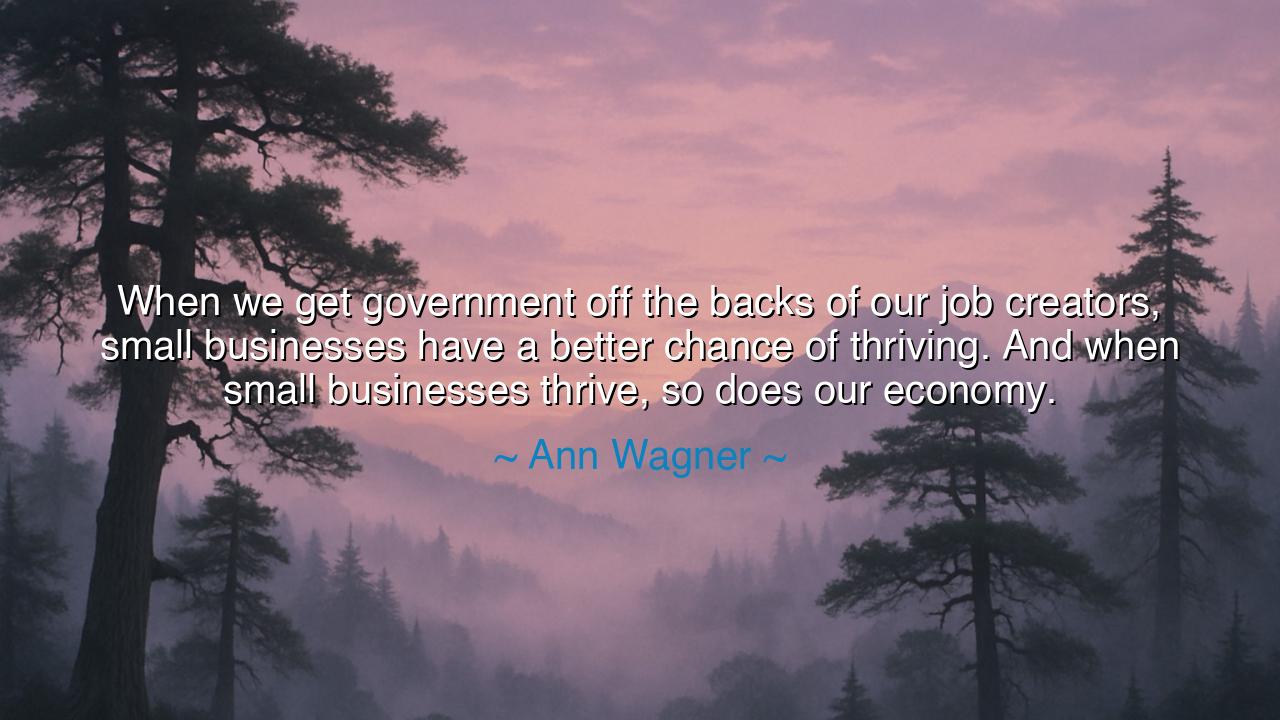
When we get government off the backs of our job creators, small
When we get government off the backs of our job creators, small businesses have a better chance of thriving. And when small businesses thrive, so does our economy.






"When we get government off the backs of our job creators, small businesses have a better chance of thriving. And when small businesses thrive, so does our economy." These words from Ann Wagner strike at the heart of a powerful truth about the interconnectedness of freedom, entrepreneurship, and the economic health of a nation. Wagner speaks to the idea that small businesses—those humble yet vital engines of growth—are best suited to flourish when they are not burdened by excessive regulation or governmental interference. When job creators are given the space to operate freely, they can thrive, leading to a ripple effect that nourishes the broader economy.
This belief in the power of small businesses as the backbone of the economy is an ancient idea that stretches back to the beginnings of civilization. In ancient Greece, Plato and Aristotle understood the importance of small, local economies. Plato, though he idealized a centralized society, acknowledged that true flourishing occurred in small, autonomous communities where individuals could engage in trade, craftsmanship, and entrepreneurship. He saw these small economic systems as vital to both the individual and the polis—the community at large. Similarly, in the ancient world, it was often the craftsman, the merchant, and the trader who sustained the local economies, often at odds with larger, more centralized forms of governance.
One of the most powerful examples from history comes from the early days of the Roman Republic. As the Romans expanded their empire, the small traders and artisans of Rome were able to flourish, creating a vibrant economy driven by individual effort. However, when the Republic shifted toward empire, with more centralized control and taxation, small businesses began to struggle under the weight of government demands. The shift from a thriving, independent society of merchants to an empire ruled by bureaucracy illustrates the fragility of the entrepreneurial spirit when too much control is exerted. As Wagner suggests, it is in the freedom of the small business owner that true economic vitality arises.
In our own time, we can look to the Industrial Revolution as a period that transformed economies by empowering small entrepreneurs to thrive. During this period, new technologies and the freedom to innovate created a wave of entrepreneurial spirit, resulting in the rise of small businesses that would grow into the industrial giants of the modern world. Henry Ford, for instance, began with the vision of a single automobile and built an empire by creating jobs and expanding the economy. This growth was possible not because of excessive government oversight, but because Ford and other entrepreneurs were given the freedom to experiment, to take risks, and to create new opportunities.
This brings us to the lesson Wagner offers: that when government steps back and allows entrepreneurs the space to create and innovate, the economy as a whole flourishes. The key to economic prosperity is not the imposition of regulations and taxes, but the freedom to operate in a fair and open marketplace. Small businesses, the true heart of any economy, are the places where innovation begins, where jobs are created, and where new ideas are born. When these businesses are freed from unnecessary burdens, they have the power to grow and contribute to the well-being of the nation.
The lesson for us today is clear: we must support the entrepreneurs and job creators in our communities by allowing them to thrive without excessive governmental interference. Whether it is through reducing taxes, streamlining regulations, or simply creating an environment where small businesses are encouraged to take risks, we must recognize that the health of the economy depends on the health of these small businesses. In our own lives, we can apply this wisdom by supporting local enterprises, by fostering innovation, and by understanding that a thriving economy is rooted in individual effort, not in the heavy hand of the state.
Thus, let us strive to create a world where freedom and entrepreneurship are celebrated. Let us remember that the path to economic prosperity is not through control and regulation, but through empowering the individual, the small business owner, and the job creator. The future of our economy depends not on centralized control but on the independent spirit of those who dare to take risks, create jobs, and drive innovation. Like the great leaders of history, we must nurture this entrepreneurial spirit, for it is the foundation of a prosperous and vibrant society.






AAdministratorAdministrator
Welcome, honored guests. Please leave a comment, we will respond soon